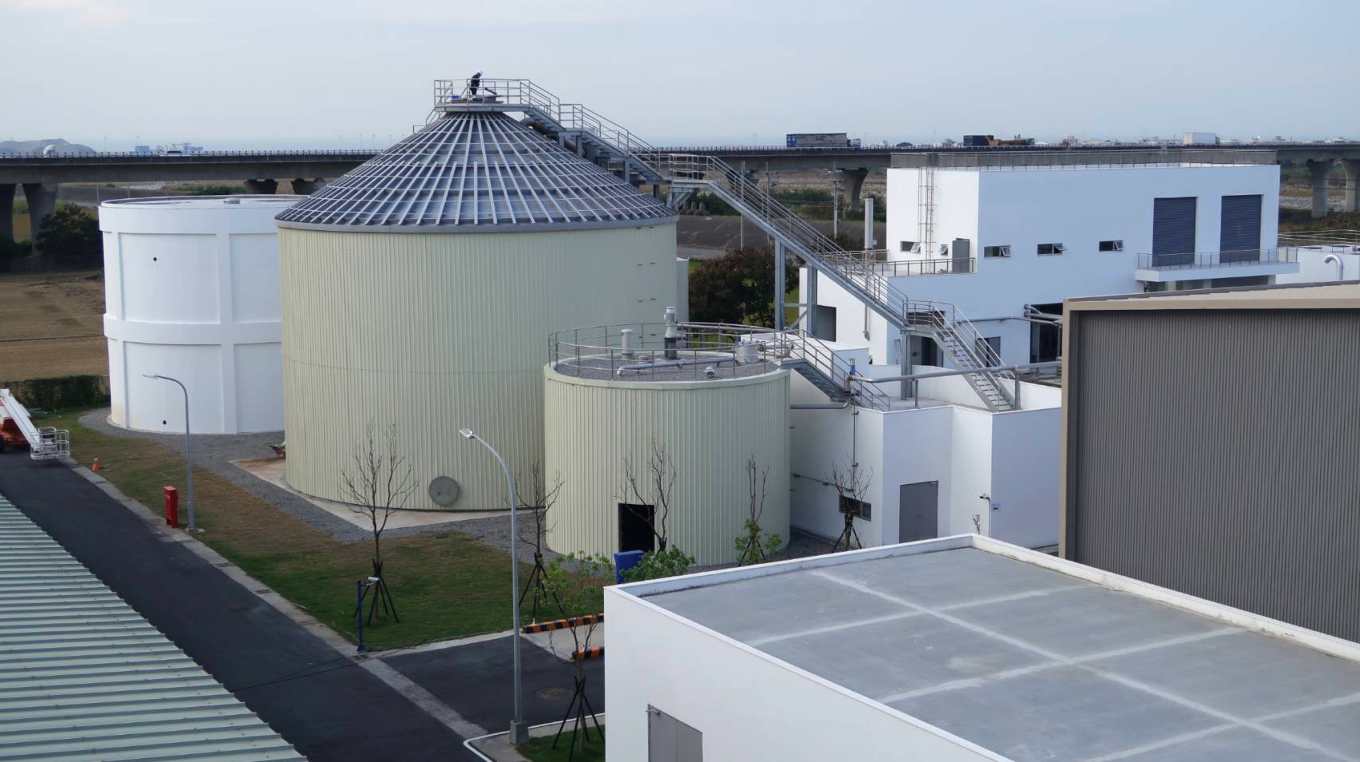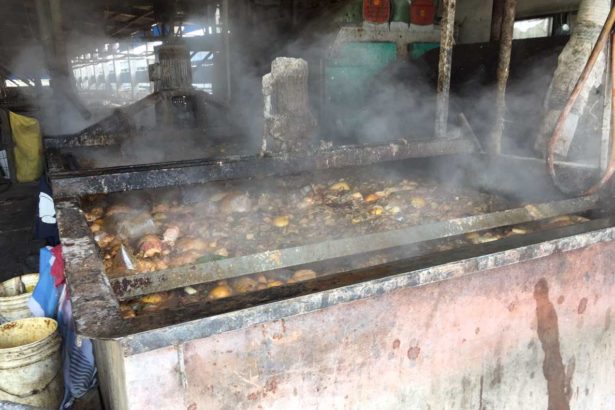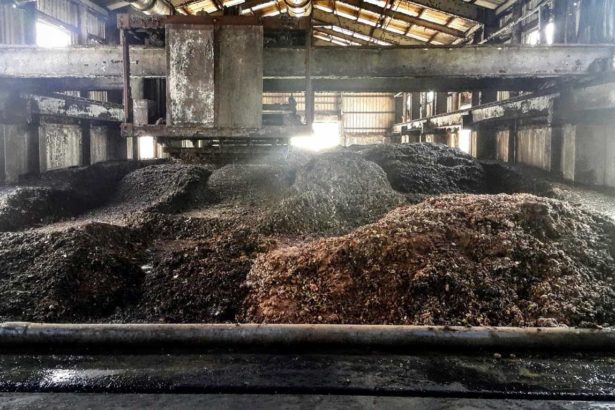How many tons of kitchen waste is produced every day, and what are the problems caused by treatment? how much organic fertilizer?
Share
+ 1
Tweet
(upstream and downstream journalists Duan Yaxin, Liu Yixin, Cai Jiashan / tr. by Phil Newell)
In order to prevent and stop the epidemic of classical swine fever in Africa, the Council of Agriculture announced that pigs raised with food waste should be strictly inspected. Those who do not meet the conditions for high-temperature cooking and do not have the qualification for "re-inspection and utilization" of the Environmental Protection Agency should stop using food waste to raise pigs. In the event of an outbreak in the country, pig raising with food waste will be completely stopped.
Taiwan produces about 1 million metric tons of cooked food waste every year. In terms of counties and cities, how much food waste are there in various places at present?. What is the way of demineralization? If there is a total ban on raising pigs with food waste, how will the environmental protection units of various counties and cities respond? What are the detailed supporting measures? Chen Jizhong, chairman of the Council of Agriculture, said in an interview a few days ago that all localities are speeding up their stocktaking and will submit their plans to the Environmental Protection Agency.
If African classical swine fever breaks out tomorrow, food waste will immediately become a battlefield. Are all places ready? "upstream and downstream" contact local environmental protection bureaus to obtain first-line information. This article takes an inventory of Liudu. Other major pig farming counties include Pingtung, Yunlin, and Changhua. Please click here to read. (other counties and cities are taking stock one after another and will continue to publish)
(background note: the following food waste recycling figures are official statistics, but many food waste pig farmers say that the official statistics on food waste are not accurate, because there has been a long-standing situation of "reporting more than food waste" in the process of food waste recovery. Private operators drive minivans with buckets of food waste on them, so they accept them everywhere, mostly for households, snack bars and night markets, which may not be included in the statistics. Please refer to readers.)
Taipei City: 111 metric tons of kitchen waste are sent to their own composting yard and private composting yard in other counties and cities.
Li Henggou of the waste disposal and Management Department of the Taipei Municipal Environmental Protection Bureau said that the amount of food waste reported by public institutions with tubes is 62 tons a day, while those without tubes are initially estimated to be about 38 tons, adding up to 100 metric tons. The school nutritious lunch is recycled by the group caterers, and it is also a declared part. Together with the household kitchen waste of 11 metric tons, the total is 111 metric tons. The composting sites expected to be sent include their own public composting plants in the north city and private composting sites in other counties and cities.
In the past, Taipei City commissioned private composting plants in Pingtung and Yunlin in other counties to deal with raw compost kitchen waste (raw kitchen waste), about 50-60 tons. In the past, these food wastes were shipped out without dehydration, but in the future, if pig food waste (cooked food waste) is to be added, the raw and cooked food waste will be dehydrated, reduced to 1/3, and then transported.
But what if, in the future, composting farms in counties and cities have to give priority to their own food waste, and can no longer accommodate Taipei food waste? Li said that it is necessary to see the situation. The composting plants in other counties and cities cooperated by Taipei City are private composting farms, not public ones.
The Environmental Protection Agency said a few days ago that it will provide guidance on the planning and guidance of large-scale food waste production sources, hoping to provide guidance to operators (such as Dingtaifeng and COSTCO) who produce more than one ton of food waste per day to set up their own food waste treatment equipment. Ding Taifeng said that it has not yet received the relevant information and will learn more about it.
2. New Taipei City: the surplus of Nissan cooked kitchen is about 250 metric tons, which will be handled under the command of the central government in the future.
Nissan "compost kitchen waste" (raw kitchen waste, refers to food that cannot be eaten by human beings) 200 tons, since there is no composting plant in the country, it is mostly taken over by the composting industry in the central and southern part of the country. At the same time, as much as 100 tons of "pig food waste" (cooked food waste, which refers to human edible leftover food) is recovered by the cleaning team every day, and another 100-150 tons of food waste is still in circulation in the market. in the past, almost all of this food waste was absorbed by pig farmers in Xinbei and Taoyuan.
Sun Zhongwei, spokesman for the New Taipei City Environmental Protection Bureau, said: at present, this city does conduct sand table exercises on various possible situations and draw up various countermeasures, but if African classical swine fever invades Taiwan, the whole of Taiwan will enter the stage of epidemic prevention. All counties and municipal governments must accept the command and supervision of the central government, and New Taipei City will follow suit at that time.
Third, Taoyuan: cooked kitchen surplus of about 150 metric tons, start biomass energy in 2021, composting and incineration during the transition period
According to the statistics of the Taoyuan Municipal Environmental Protection Bureau, the average daily kitchen waste of every household in Taoyuan City is 82 metric tons, of which 98.8% is pig food waste and 1.2% is compost food waste. The average daily kitchen waste is 68 metric tons, of which 90.3% is used for pig food waste, and the remaining 9.7% is used for other reuse, such as fertilizer.
If there is a total ban on raising pigs with food waste, how should the food waste be removed? The Environmental Protection Bureau responded that the BOT case of Taoyuan Biomass Energy Center has been signed and is expected to be put into operation before July 110, which can convert kitchen waste into energy for power generation. Lu Mingfu, a senior technician of the Environmental Protection Bureau, further explained that the biomass energy center is estimated to be able to handle 250 metric tons of kitchen waste a day, regardless of raw and cooked food waste. Compared with the daily kitchen waste of 150 metric tons in Taoyuan City, the future biomass energy center can completely deal with the kitchen waste in Taoyuan City.
But how to solve the problem of short-term removal of kitchen waste before the operation of the bioenergy center? The EPA pointed out that in the transitional period, rapid composting fermentation, burial, incineration or pulping of kitchen waste can be used. At present, there are 2 incineration institutions and 2 composting reuse institutions in Taoyuan area.
However, the Environmental Protection Bureau stressed that in addition to considering the cost, the EPA must also consider the multi-oriented evaluation factors of the site, related processing and implementation. At present, the city government is evaluating the feasibility of each plan. Lu Mingyi explains that at present, there are two small publicly owned composting plants in Taoyuan City. If cooked kitchen waste is used for composting, it can handle about five metric tons a day. Other private composting plants deal with agricultural waste and do not collect kitchen waste.
According to estimates, the compost of cooked kitchen waste in Taoyuan City can only handle five metric tons a day, so how to deal with 150 metric tons of kitchen waste per day? Lu stressed that this is a short -, medium-and long-term plan, and the central government is taking stock of the capacity of composting sites across the country to meet the composting needs of cooked food waste. Taoyuan City can make use of composting sites in other counties and cities.
With regard to the heavy oil and salty leftover from the cooked kitchen, how to use it as compost directly, Lu says that dehydrating the kitchen waste can separate salt and oil, although not to 100%, to at least 50% to 70%. In response to the problem of the odor of cooked kitchen waste compost, the Environmental Protection Bureau responded that the kitchen waste should be treated by composting, which needs to be turned or stirred in the ripening process, which will inevitably cause part of the flavor to escape in the ripening process. Therefore, in addition to considering the conditions of the hinterland of the composting site, composting techniques such as traditional efficient or rapid fermentation must also be considered.
As for the restaurant operators, they could have made money by selling food waste, but now they have to pay for compost. Can the restaurant operators cooperate?. The EPA said that restaurants and snack bars already have the obligation to properly clean up their waste. once the central government announces a ban on raising pigs, food waste generated by restaurants and snack bars should be incinerated or composted by qualified institutions for removal, treatment (reuse).
4. Taichung City: if raising pigs after cooking is banned, there will be 192 metric tons of cooked kitchen surplus, mainly incineration.
Chen Xiuling, head of the waste Management Section in Taichung City, said that the total daily recovery of kitchen waste in Taichung City is about 126 tons, and the leftover amount of cooked kitchen is about 96 tons, which comes from households and snack bars along the street, while the surplus of raw kitchen is about 30 tons. Raw kitchen leftovers are used for composting, while cooked kitchen leftovers are used to feed pigs to pig farmers. There are five composting plants in Taichung City, and because cooked kitchen waste will smell bad, the public will resent it, so it is all aimed at the removal of raw kitchen waste. Commissioner Huang says that at present, the handling capacity of 30 tons of raw kitchen waste is nearly saturated.
After the ban on raising pigs with kitchen waste, how to adjust the recycling of cooked kitchen waste? Chen Hsiu-ling said that from pig farmers in Taichung City, it is estimated that the amount of cooked food waste recovered will about triple to 192 tons. At present, it is planned to fight for a budget from the central government for the purchase of additional recycling vehicles and kitchen waste cans, and the detailed figures are still being counted.
In addition, in order to solve the problem of food waste, Taichung City has built the country's first biomass energy plant in Waipu. Huang Jiawen, commissioner of the waste Management Section, said that it was originally intended to solve the problem of nearly saturated raw kitchen waste, but the problem of removal of cooked kitchen waste has emerged, and whether the equipment in the plant area can handle cooked kitchen waste is being studied. Huang said that according to the current assessment, if pre-purification equipment such as oil fishing and decontamination are purchased, cooked food waste should be able to be removed through biomass energy plants. Waipu Biomass Energy Plant is currently in the first stage of construction, which can handle 80 metric tons of kitchen waste per day. When the second stage of construction is completed, the energy for the removal of kitchen waste in the whole plant can reach 160 tons per day. It is planned to start operation in June this year.


Composting plant _ provided by Kaohsiung Environmental Protection Bureau
Series of reports on African Classical Swine Fever epidemic Prevention and Kitchen waste War
(for news related to African classical swine fever, please click here to read)
Share
+ 1
Tweet
- Prev

The Battle of epidemic Prevention and Kitchen waste 07 "Total inventory of production and removal of Kitchen waste in Taiwan (Yunlin Pingtung)
The Battle of epidemic Prevention and Kitchen waste 07 "Total inventory of production and removal of Kitchen waste in Taiwan (Yunlin Pingtung)
- Next

Epidemic Prevention and the War of Kitchen waste 05 "opportunities and challenges for composting! Local kitchen waste can be made separately, even Daan Forest Park.
Epidemic Prevention and the War of Kitchen waste 05 "opportunities and challenges for composting! Local kitchen waste can be made separately, even Daan Forest Park.
Related
- A course of planting techniques and methods on how to grow carrots
- How to plant the latest tulips?
- Is it better to pick tea in the morning or in the afternoon? When is the best time for tea to be picked? what is the third or fifth tea?
- Launch Yuanxiao Happy combination Haocha + Tea Yuan healthy Taste
- Penghu Tourism "Fireworks 20 Parade with You"
- 2022 West Lake Happiness holds "Digital Revitalization Voucher" and draws iphone13 and laptop.
- Banqiao Fuzhou social houses are designed to change start-up combined with police elimination to create a safe and livable environment
- The convenient measure of "mechanical weeding" in Xinbei has been abused and the Agriculture Bureau has imposed heavy penalties on the illegal land consolidation.
- Changgeng University Joins Hands with Four Memory Factories to Rescue Memory Talent Shortage
- The list of Taiwan's top 100 MVP managers is listed by the Director-General of the Farmers' Association of Sanxia District.

